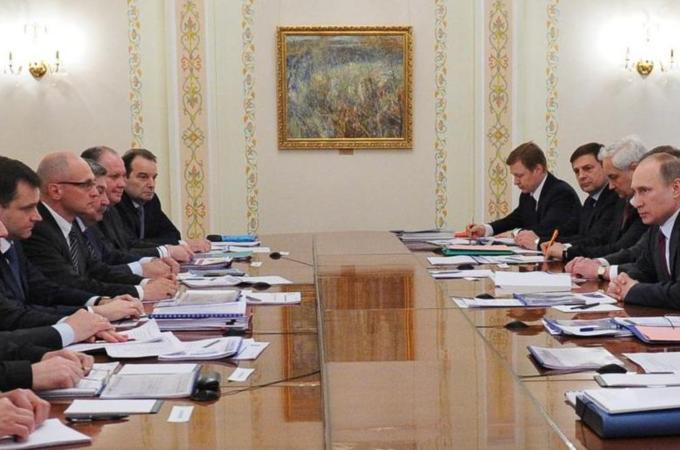Ukraine economy choked by political unrest
Workers and business owners in Ukraine feel the heat of recent turmoil as prices rise and capital flight intensifies.

Odessa, Ukraine – For 25-year-old Alona, living in crisis-hit eastern Ukraine means she is already worried about clashes on the streets and where she might be living in the future if Russia invades. Now, she has another concern: job security.
“Our company asked us [to take] unpaid vacations and if we request these unpaid vacations we can save our [jobs],” she told Al Jazeera.
Alona works as an HR manager at a consultancy firm which she says has experienced a 30 percent drop in demand for some of its services since the crisis started. She fears this drop will only continue because one of the first things clients cut are their advisory services.
Alona also says imported products have become more expensive as the Ukrainian currency continues to slide. It lost two-fifths of its value since the start of the year. She says a dress that cost about $30 in February now costs $40.
Her father is a taxi driver and her mother is unemployed, meaning it is especially important for the family to safeguard what money they do have. “In this situation, banks aren’t safe,” Alona says. “We have less deposits at the bank because we keep our money at home now.”
Ukraine’s crisis started in November with mass demonstrations against President Viktor Yanukovich’s decision to give up a European Union trade deal in favour of closer ties with Moscow. Yanukovich was overthrown and an interim government established, but the instability spread to the southeastern peninsula of Crimea, which was annexed by Russia.
Now, eastern Ukraine is in turmoil as pro-Russian protesters demand independence. Violence has spread to the south in Odessa where at least 42 people died in clashes on Friday, increasing fears of a civil war.
Still open for buisness?
Alexander Varichenko, 39, is a manager at a Donetsk-based international steel company with a quarter of its business coming from Russian clients. He thought that would safeguard the business from rising tension between Ukraine and Russia, but he was wrong.
Varichenko says that since November, customs officials have held up trucks at the border for much longer than normal, imposing new costs on businesses. “They fulfil [the] Russian government’s order and that is a kind of way to punish Ukraine,” he says. “Maybe there will be a decrease in clients because they aren’t sure their goods will be delivered.”
The company is also under pressure since Russia increased prices for its gas supply. Varichenko is now considering whether the firm should increase prices or lower production. “If Russia won’t leave Ukraine alone… the situation will become worse and worse,” he says.
While the country’s economy has been weak since Ukraine’s independence, recent instability has exacerbated the situation. The International Monetary Fund (IMF) says Ukraine would need more funding if the east was annexed after the organisation already agreed to a $17bn bailout.
Adrian Karatnycky, a senior fellow at The Atlantic Council, who advises investors in Ukraine, says fears of a Russian invasion or continued instability will frighten investors. If, however, the country goes ahead with a presidential election on May 25, that could signal some level of stability, he says.
Putin’s strategy
 |
| Russian President Vladimir Putin says he would not recognise the legitimacy of a new Ukrainian president should one be elected on May 25 [AFP] |
If such an election were to take place, Russian President Vladimir Putin says he would not recognise it.
Putin also faces economic turmoil at home. Russia’s currency has fallen by 10 percent this year. At the end of April, the IMF said Russia’s economy would grow by just 0.2 percent this year, cut from an earlier forecast of 1.3 percent.
The organisation says that sanctions implemented by Europe and the United States over the conflict has scared off investors, causing capital flight.
Karatnycky says that while a global economic crisis is not guaranteed, Russia has more to lose than the West, but other countries would still be affected by sanctions and turmoil. “It could have a knock on effect… it [could] be a recession in the West,” the analyst says.
This month, Russia threatened to decrease its supplies of natural gas to Ukraine after claiming the country owed billions in unpaid bills. Russia provides one-third of the European Union’s gas imports.
If the gas supply was disrupted, Karatnycky says countries could quickly address the situation by using alternative energy. “All of this is really very abstract because we don’t know how bad it’s going to get,” he says. “We don’t know how deep the disruption will be to the economy.”
While the conflict has increased concerns over Ukraine’s economy, it has been plagued by deeply-rooted problems for years. At the beginning of April, The Kyiv Post reported that the black market economy accounted for almost 20 percent of the country’s GDP, citing government figures.
Overcoming corruption
Widespread corruption has limited Ukraine’s economic growth and the country could not adapt to capitalism as well as countries like Poland which had similar economic traits yet grew at a much quicker pace following the collapse of communism, according to Karatnycky.
In 2013 Transparency International ranked Ukraine 144 out of 175 countries and territories in the corruption perceptions index, putting it below Russia. “The impact of corruption on Ukraine [and] its economy is just devastating because corruption is everywhere,” says Transparency International’s Andrei Maursov. “The loss to the economy is just immense”.
Last month, US Vice President Joe Biden said Ukraine had to “fight the cancer of corruption”.
Maursov credited the movement that toppled Yanukovich with highlighting the level of corruption in the country. After the former president fled, images of his luxurious house shocked and angered many who wondered how the leader could have accumulated such wealth.
Maursov says, “Here we have a joke that even the princes of Saudi Arabia would envy Yanukovich.”